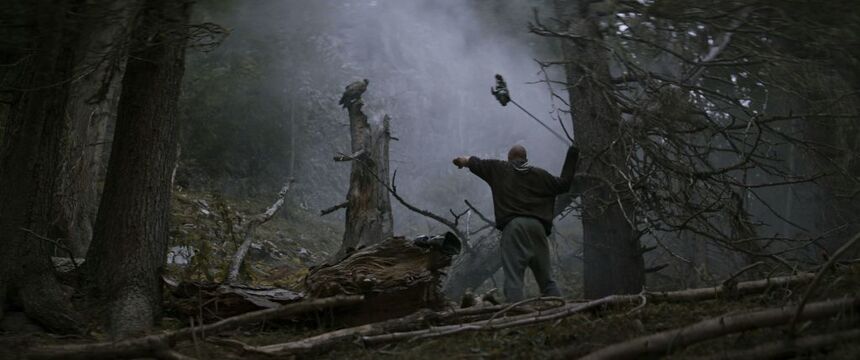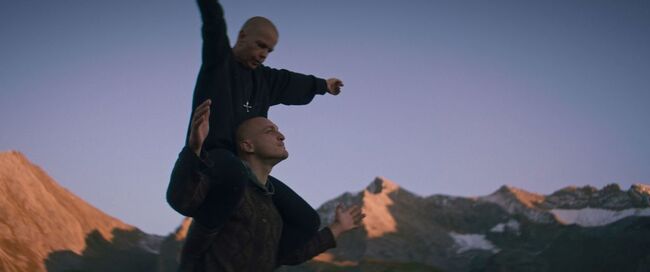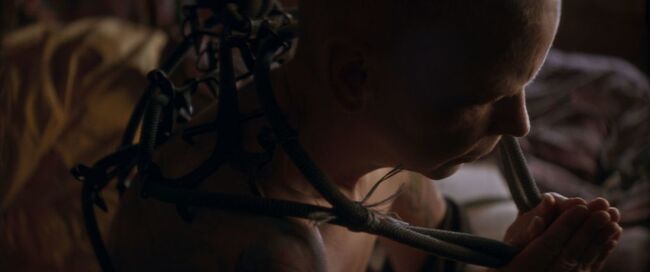Locarno 2021 Review: LUZIFER Rising in Oedipal Horror, Veiled as Lyrical Drama of Atonement
Franz Rogowski and Susanne Jensen star in a horror drama, directed by Peter Brunner.

The dramatic title of Peter Brunner's first feature-length offering, Luzifer, produced under the auspice of Austrian provocateur excellent, Ulrich Seidl, had built high expectations.
Brenner revealed he did a fair share of research on the topic of matricide to prepare the script for Luzifer. Thus, the story is not based on a single act of the heinous crime, but rather stems from a generalization based on the usual circumstances. Luzifer plunges into the disturbed psyché of a child raised outside the limits and norms of society.
Brunner sets the story in a solitary spot somewhere in the Alps, where Maria is living a seemingly peaceful life in harmony with nature and God. She is sharing a simple existence with her son Johannes, who is described as a modern-day Kaspar Hauser. Commanding a very limited vocabulary and reasoning, Johannes is a child trapped in an adult's body, acting mostly on basic impulses. He grew up detached from the outside world in ascetic conditions.
Maria took the self-imposed expulsion from the civilization less as a Walden-like craving and more as a result of her previous sinful life. Her completely inked body bears witness to her history of a wild life, fueled by alcohol and drug excess. She is carrying out atonement and praising God for keeping her clean and sober.
Luzifer moves at a glacial pace throughout the first half as Brunner takes time and images to craft an image of the pastoral idyll of an atoning mother bonding with her adult son, whom she kept at the mental level of a child, featuring overlong, meditative shots of pristine nature untouched by filthy human hands, a Luddite existence unburdened by social conventions and obligations, and a family idyll of daily doses of ora et labora and Johannes playing with his best friend, an eagle. However, seeds of distress and discomfort are sprouting in the mountainous Eden.
Out of the blue, Brunner inserts a brief yet all the more dreadful crepuscular shot of a mutilated body stuck in a small lake. Something wicked lurks in the mountains and the saintly family duo is hiding something rotten. The drama accelerates as Maria and Johaness become the target of attempts for eviction.
A new ski resort is about to be built in the mountain and their ramshackle shed stands in the way of greedy developers. In a rather inelegant scriptwriting twist, Brunner drops a party of roughnecks to terrorize the family with drones, showing no respect for nature.
Luzifer could sustain itself solely on the mother-son chamber drama, since an inevitable antagonism is encoded between the characters. The superficial conflict with the vile outside world steals the subtleness that Brunner kept building in the overstretched running time. The mother-son's resistance to selling the land arises as an on-the-nose metaphor of perverted capitalism invading Mother Nature, where there was not truly need for such a subplot.
The central line of Maria's nurturing motherly love hides the ultimate perversion, as she willingly chose to raise her son without proper understanding of the world and thus intentionally incapacitated his cognitive faculties. The missing father figure, religiously over-zealous mother and suppressing of awakening sexual urges destine Johannes to become an Ed Gein-sort of figure.
As Brunner reveals more from the lives of Maria and Johannes, the actual story arises from the implications. The sociopathic mother is raising a psychopathic son. Luzifer is a modern-day Frankenstein, where boundaries between moral and amoral have been blurred by a distorted interpretation of a strict religious doctrine.
Brunner walks a thin line between psychological drama and serial killer horror, attempting to hide and dissolute the latter under mundane and contemplative shots of nature. The director hides the film's genre side, pining for the psychological drama of Johannes' awakening in a grotesque rite of passage. The mother's Christian iconography is in stark contrast to the pagan imagery of nature and Johannes lives in both worlds until the maternal cord gets cut in the notoriously oedipal style.
Luzifer shares the family D.N.A. of Veronika Franz and Severin Fiala, movies that are not afraid to acknowledge their genre origin. However, Brunner adopts a much more lyrical approach to tackle the genre, trying to build strong parables on inter-generational trauma, parents perverting children on the basis of self-induced delusion, the clash of religion and paganism, nurture versus nature, and, last but not least, all-consuming capitalism.
The hodge-podge of ideas and motifs is carefully laid out in Brunner's script, even though he occasionally utilizes way-too-explanatory plotting for its own good. The superb performances by Susanne Jensen as Maria and Franz Rogowoski in the role of Johannes could easily pull off the chamber psychological drama on their own (along with a small but crucial contribution by Monika Hinterhuber). Peter Flinckenberg's cinematography ensures the lyrical and meditative imagery along with pagan mysticism and the unrelenting rawness of Johannes' awakening.
Luzifer
Director(s)
- Peter Brunner
Writer(s)
- Peter Brunner
Cast
- Franz Rogowski
- Susanne Jensen









